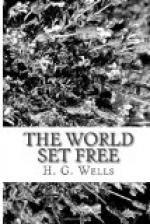‘All history,’ he said, ’is a record of a childhood....
’And yet not exactly a childhood. There is something clean and keen about even a sick child—and something touching. But so much of the old times makes one angry. So much they did seems grossly stupid, obstinately, outrageously stupid, which is the very opposite to being fresh and young.
’I was reading only the other day about Bismarck, that hero of nineteenth-century politics, that sequel to Napoleon, that god of blood and iron. And he was just a beery, obstinate, dull man. Indeed, that is what he was, the commonest, coarsest man, who ever became great. I looked at his portraits, a heavy, almost froggish face, with projecting eyes and a thick moustache to hide a poor mouth. He aimed at nothing but Germany, Germany emphasised, indurated, enlarged; Germany and his class in Germany; beyond that he had no ideas, he was inaccessible to ideas; his mind never rose for a recorded instant above a bumpkin’s elaborate cunning. And he was the most influential man in the world, in the whole world, no man ever left so deep a mark on it, because everywhere there were gross men to resonate to the heavy notes he emitted. He trampled on ten thousand lovely things, and a kind of malice in these louts made it pleasant to them to see him trample. No—he was no child; the dull, national aggressiveness he stood for, no childishness. Childhood is promise. He was survival.
’All Europe offered its children to him, it sacrificed education, art, happiness and all its hopes of future welfare to follow the clatter of his sabre. The monstrous worship of that old fool’s “blood and iron” passed all round the earth. Until the atomic bombs burnt our way to freedom again. . . .’
‘One thinks of him now as one thinks of the megatherium,’ said one of the young men.
’From first to last mankind made three million big guns and a hundred thousand complicated great ships for no other purpose but war.’
‘Were there no sane men in those days,’ asked the young man, ’to stand against that idolatry?’
‘In a state of despair,’ said Edith Haydon.
’He is so far off—and there are men alive still who were alive when Bismarck died!’ . . . said the young man....
Section 5
‘And yet it may be I am unjust to Bismarck,’ said Karenin, following his own thoughts. ’You see, men belong to their own age; we stand upon a common stock of thought and we fancy we stand upon the ground. I met a pleasant man the other day, a Maori, whose great-grandfather was a cannibal. It chanced he had a daguerreotype of the old sinner, and the two were marvellously alike. One felt that a little juggling with time and either might have been the other. People are cruel and stupid in a stupid age who might be gentle and splendid in a gracious one. The world also has its moods. Think of the mental food of Bismarck’s childhood; the humiliations of Napoleon’s victories, the




